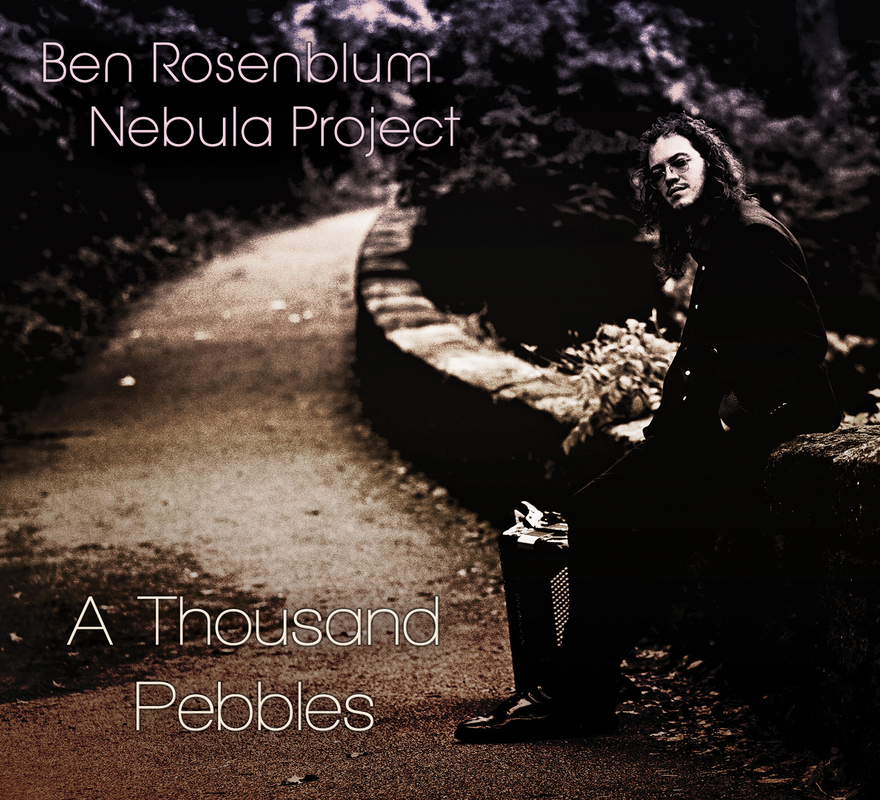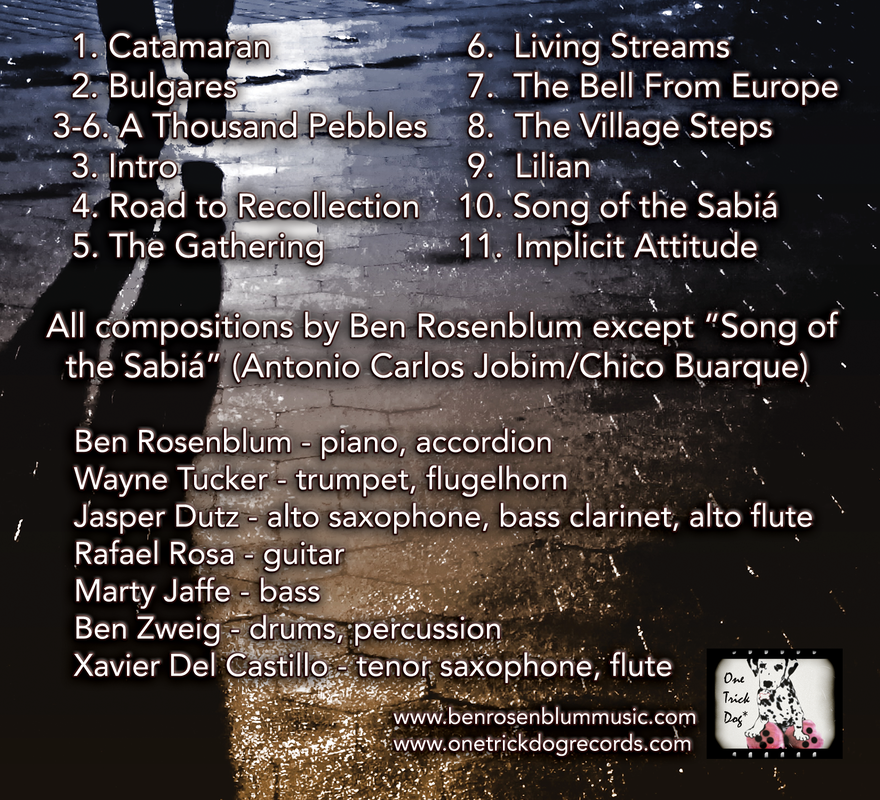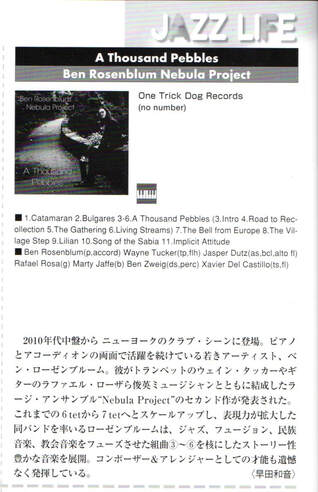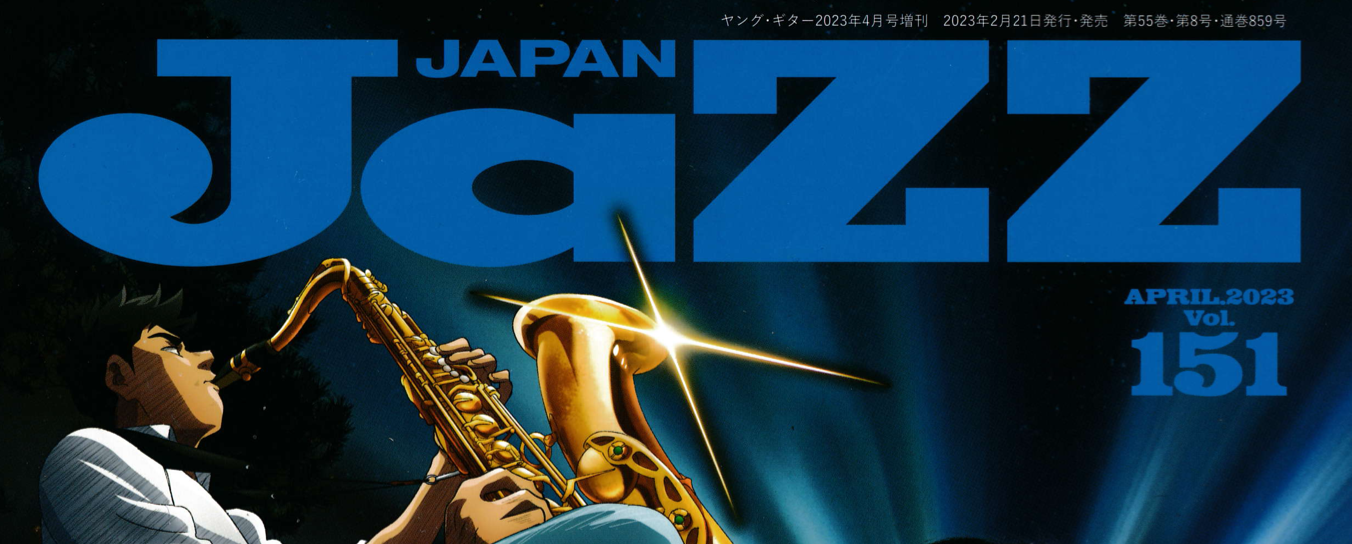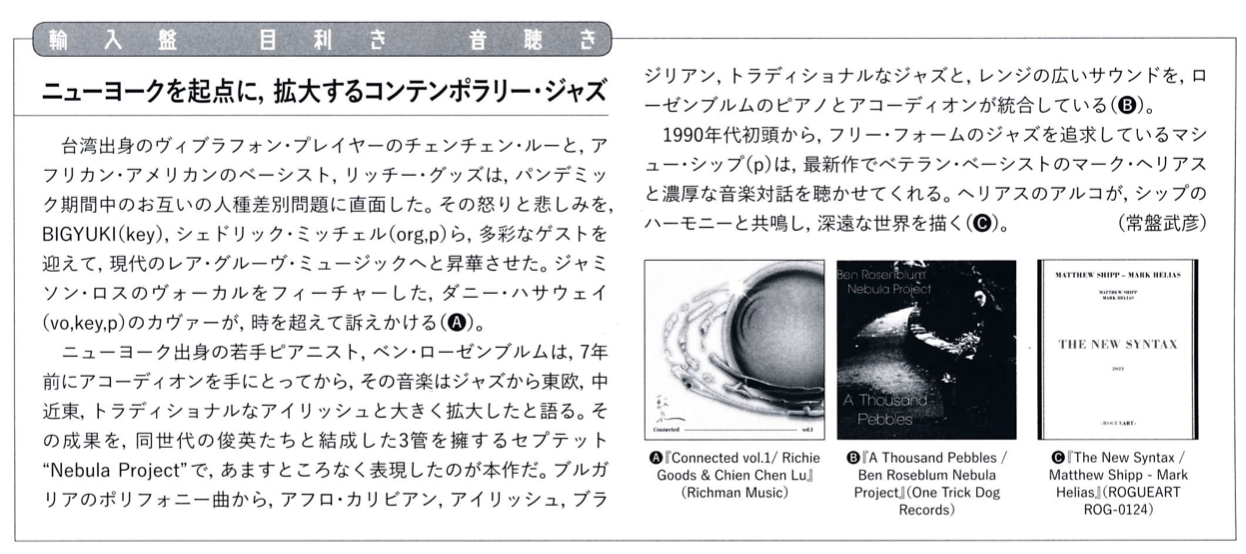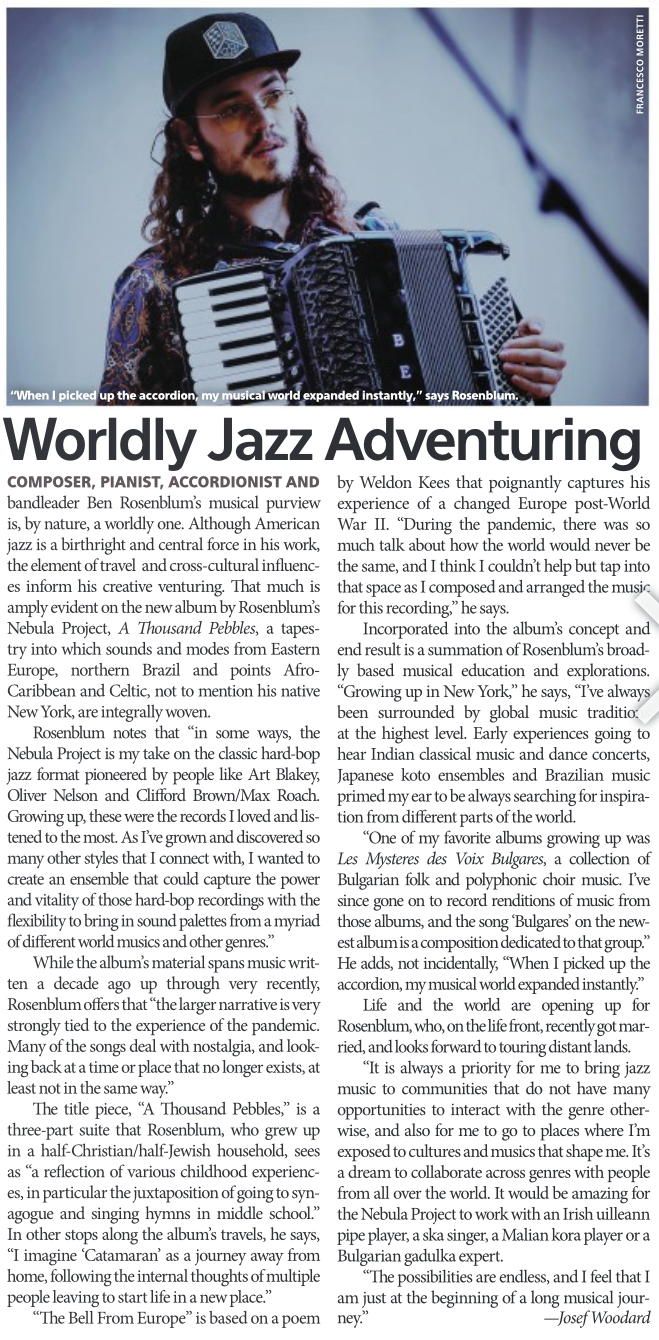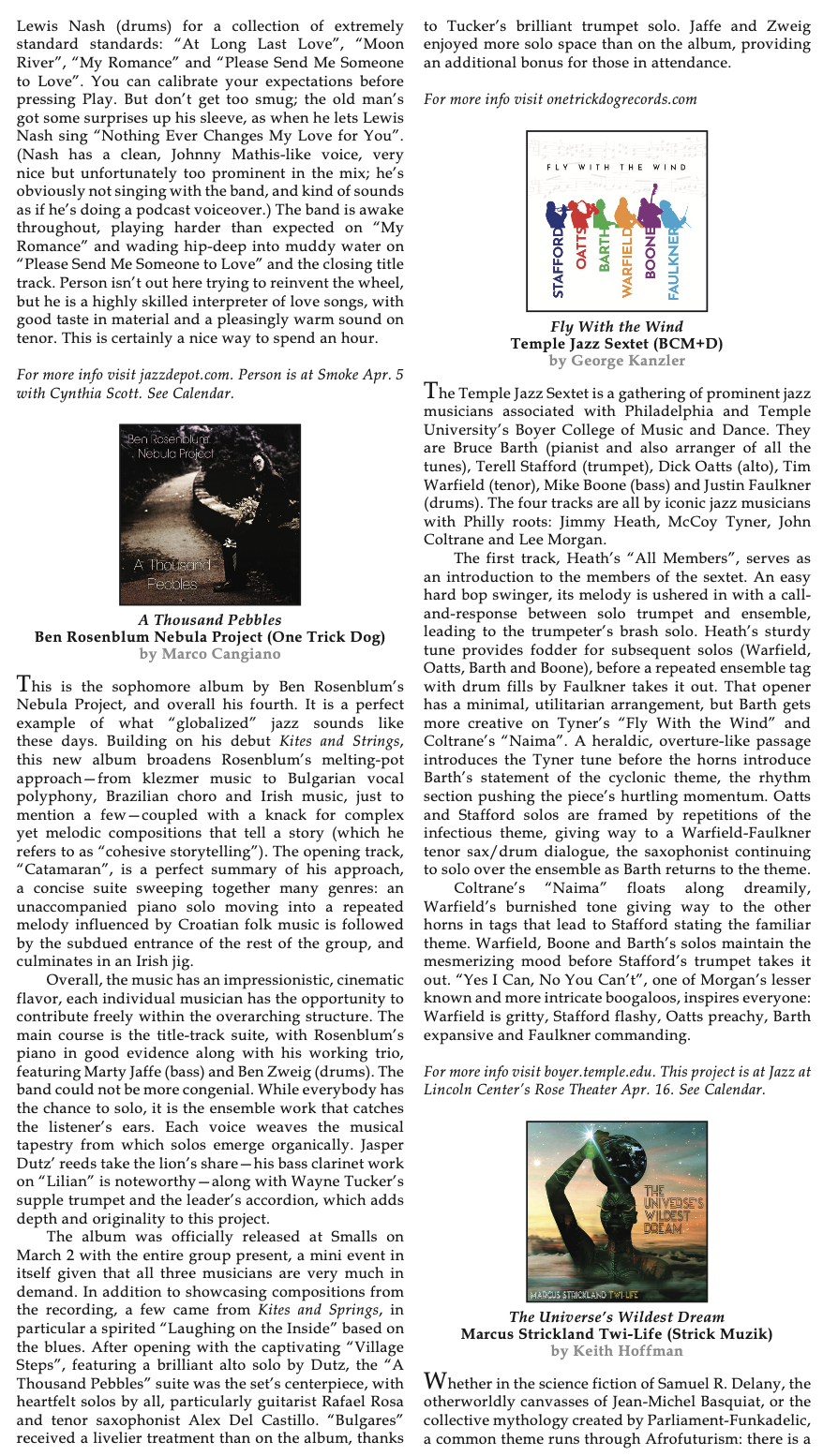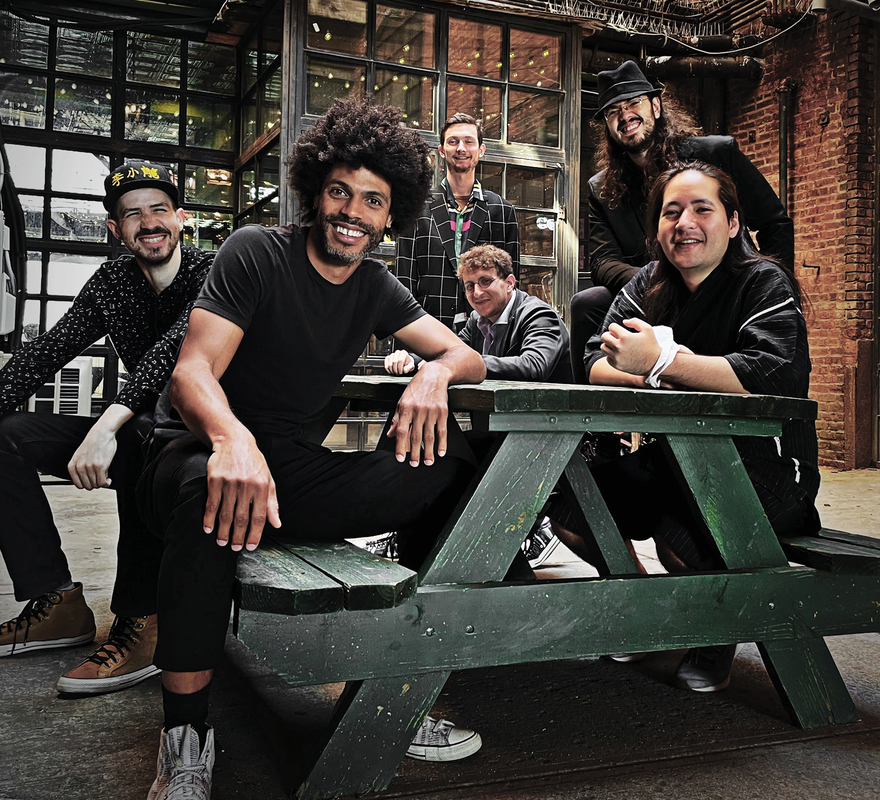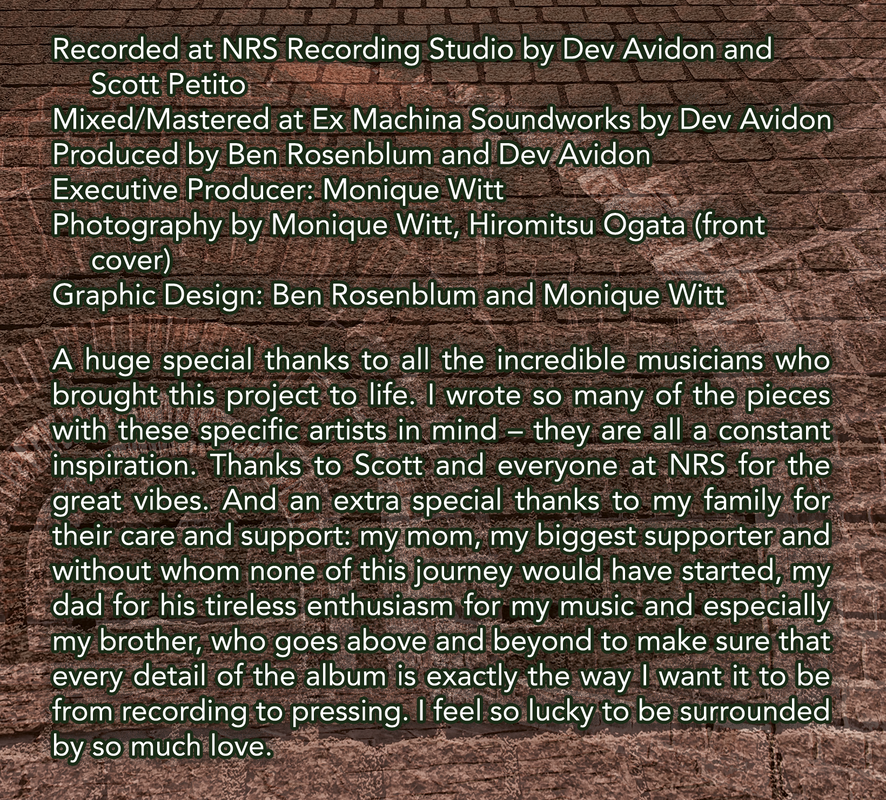OUT NOW: Ben Rosenblum's Fourth Album, A THOUSAND PEBBLES !! (Released: 2/10/23)
Hey everyone! I'm thrilled to be releasing my fourth album as a leader, and the second one with my large ensemble, the Nebula Project! This release, entitled A Thousand Pebbles, was released on Friday, February 10th to all streaming platforms. It features almost exclusively original compositions, and the same amazing core band of musicians from the previous album, Kites and Strings - Wayne Tucker on trumpet, Jasper Dutz on alto sax, bass clarinet and alto flute, Rafael Rosa on guitar, Marty Jaffe on bass, Ben Zweig on drums, and yours truly on piano and accordion. For half the album, we're also joined by the amazing Xavier Del Castillo on tenor sax and flute.
To purchase a physical copy, visit our online store here. You can also purchase digital copies on iTunes or Amazon.
Click the following links to stream on Spotify, Apple Music, Tidal, or YouTube.
To purchase a physical copy, visit our online store here. You can also purchase digital copies on iTunes or Amazon.
Click the following links to stream on Spotify, Apple Music, Tidal, or YouTube.
Selected Reviews of the album:
"Composer, pianist, accordionist and bandleader Ben Rosenblum's musical purview is, by nature, a worldly one. Although American jazz is a birthright and central force in his work, the element of travel and cross-cultural influences inform his creative venturing. That much is amply evident on the new album by Rosenblum's Nebula Project, A Thousand Pebbles, a tapestry into which sounds and modes from Eastern Europe, northern Brazil and points Afro-Caribbean and Celtic, not to mention his native New York, are integrally woven." - Josef Woodard, Downbeat Magazine. Full review.
"Ben Rosenblum is one of the most electrifyingly eclectic voices in jazz. . . . This rich and vastly diverse album deserves consideration for best jazz record of 2023." - Alan Young, Lucid Culture. Full review.
"The band . . . has expanded its expressive power. . . . [Rosenblum] fully demonstrates his talent as a composer and arranger." - Kazune Hayata, JazzLife. Full review below left (Japanese).
"Building on his debut Kites and Strings, this new album broadens Rosenblum’s melting-pot approach—from klezmer music to Bulgarian vocal polyphony, Brazilian choro and Irish music, just to mention a few—coupled with a knack for complex yet melodic compositions that tell a story…. a perfect example of what ‘globalized' jazz sounds like these days." - Marco Cangiano, NYC Jazz Record. Full review below.
"This is an outfit that can seemingly tackle anything and do it exceptionally well. . . . Musical boundaries dissolve throughout the release, and A Thousand Pebbles is all the better for it." - Rob Schepper, Textura. Full review.
"From the first minutes of this CD we feel that we are going to have to deal with a music of an uncommon richness." - Thierry Quenum, Couleurs Jazz. Full review.
"A pleasurable smorgasbord of contemporary jazz that is always engaging and never shopworn" - Jack Bowers, All About Jazz. Full review.
Other reviews:
Jazziz (inclusion on Spring 2023 Sampler CD)
All About Jazz (album release recap)
Music Street Journal
Český Rozhlas (Czech)
Musical Memoirs
Interview with Dave Lake (WRUU)
Musically Speaking
Diskoryxeion (Greek)
G-Point Audio
Different Noises
Salt Peanuts (Norwegian)
Japan Jazz Magazine (Japanese - below right)
"Ben Rosenblum is one of the most electrifyingly eclectic voices in jazz. . . . This rich and vastly diverse album deserves consideration for best jazz record of 2023." - Alan Young, Lucid Culture. Full review.
"The band . . . has expanded its expressive power. . . . [Rosenblum] fully demonstrates his talent as a composer and arranger." - Kazune Hayata, JazzLife. Full review below left (Japanese).
"Building on his debut Kites and Strings, this new album broadens Rosenblum’s melting-pot approach—from klezmer music to Bulgarian vocal polyphony, Brazilian choro and Irish music, just to mention a few—coupled with a knack for complex yet melodic compositions that tell a story…. a perfect example of what ‘globalized' jazz sounds like these days." - Marco Cangiano, NYC Jazz Record. Full review below.
"This is an outfit that can seemingly tackle anything and do it exceptionally well. . . . Musical boundaries dissolve throughout the release, and A Thousand Pebbles is all the better for it." - Rob Schepper, Textura. Full review.
"From the first minutes of this CD we feel that we are going to have to deal with a music of an uncommon richness." - Thierry Quenum, Couleurs Jazz. Full review.
"A pleasurable smorgasbord of contemporary jazz that is always engaging and never shopworn" - Jack Bowers, All About Jazz. Full review.
Other reviews:
Jazziz (inclusion on Spring 2023 Sampler CD)
All About Jazz (album release recap)
Music Street Journal
Český Rozhlas (Czech)
Musical Memoirs
Interview with Dave Lake (WRUU)
Musically Speaking
Diskoryxeion (Greek)
G-Point Audio
Different Noises
Salt Peanuts (Norwegian)
Japan Jazz Magazine (Japanese - below right)
Read Andrew Gilbert's interview and press release below to learn more about the inspiration for the album:
Press Release:
Brimming with brilliant young improvisers, the Ben Rosenblum Nebula Project delivers an arrestingly mature program of global jazz with A Thousand Pebbles, featuring Pianist, Accordionist and Composer Ben Rosenblum
In the expansive universe of the Ben Rosenblum Nebula Project, musical traditions collide and commingle, ignite and recombine, coalescing into strikingly expressive new forms. A pianist, accordionist and composer whose music flows from his boundless curiosity and gift for forging passionate creative alliances, Rosenblum has carved out a singular niche on the New York scene exploring a far-flung array of rhythms and sounds in compositions guided by deeply etched narratives. Slated for release on February 10, 2023, A Thousand Pebbles is his fourth album as a leader, and it represents a major creative leap from the Nebula Project’s highly regarded 2020 debut Kites and Strings. A Thousand Pebbles showcases some of the most imaginative players on the contemporary New York scene with a brilliant constellation of improvisers who are also esteemed band leaders, composers and educators. Like its predecessor, the album includes trumpeter Wayne Tucker, guitarist Rafael Rosa, reed expert Jasper Dutz, bassist Marty Jaffe, and drummer Ben Zweig. The only addition since Kites and Strings is Xavier Del Castillo on tenor sax and flute, “who’s been one of my favorite sax players for a long time,” Rosenblum says.
Rather than turning these prodigious improvisers loose, the Nebula Project is all about “cohesive storytelling,” Rosenblum says. “I’m lucky in that regard. I’ve known these guys for a while, and as I’ve gotten to play more and more with them I’ve come to understand their musical personalities. I’m writing for these musicians specifically, in a way that makes it really hard to sub when they’re not available. They’re personally invested in this project.”
Rosenblum’s music reflects his disparate musical passions, which encompass Bulgarian vocal polyphony, Northern Brazilian party music, Afro-Caribbean rhythms, and traditional Irish music. He introduces his wide-open aesthetic on the opening track “Catamaran,” a spritely, inviting expedition that traverses open seas before arriving unexpectedly at a Celtic redoubt. The accordion-driven slip jig section was inspired by a lesson with Irish accordion virtuoso Jimmy Keane and Rosenblum’s regular attendance at Monday night Irish song sessions at the Landmark Tavern in Hell’s Kitchen.
He wrote the first part of the piece in Croatia while accompanying the innovative vocalist Astrid Kuljanic, and the tune evokes the hopes and dreams of “people traveling to a new home,” he says. “The horns are the inner monologues of three different people, and I’m sort of panning the metaphorical camera from one to the other. Each horn player has a really different approach to the same harmony. I told them, imagine you’re all taking one solo continuously.”
A cinematic sensibility also suffuses “Bulgares,” a swirling theme inspired by his love of the all-woman Bulgarian vocal ensemble Les Voix Mysteres des Bulgares. The piece hurtles along in 11 with Dutz’s clarinet bringing out the reedy quality of the accordion as he and Rosenblum play the theme in unison. “The Bell From Europe” opens with a startlingly beautiful arco bass statement that Jaffe elaborates on when he puts down his
bow. It’s an elegiac theme inspired by a Weldon Kees poem as well as church bells Rosenblum heard in Croatia, and the piece is something of a meditation on the search for meaning after the slaughter of two world wars. Rosenblum is just as deft at up-close-and- personal themes, as with “Lilian,” a film noir study that centers on an alluring femme fatale portrayed with forlorn elegance by Dutz’s bass clarinet.
The album’s centerpiece is the titular four-part suite, an extended sojourn that draws partly on Rosenblum’s memories of attending synagogue during high holidays, though he didn’t grow up in a particularly Jewish-identified house. The stately trumpet-driven introduction feels like a hymn, and quickly gives way to the briskly swinging “Road to Recollection,” a vivifying piece of prog-rock hard bop. With a series of jump cut transitions, the suite evokes the Wayne Shorter multiverse with “The Gathering” and ends back in the pews with “Living Streams,” a sumptuous setting based on the chord changes for psalm 23. Rather than a spiritual journey, “I think of it more as a reflection on childhood,” he says, “trying to understand these huge forces and concepts, trying to find your own meaning in all these different traditions.”
Rosenblum closes the album with two tracks that take off in different directions. He reimagines the oft-overlooked bossa nova standard “Song of the Sabia” by transplanting Jobim’s sublime, saudade-soaked melody to the dry hinterlands of northern Brazil, setting the song to a propulsive forró groove. And he closes the curtain with the album’s most straight ahead piece, “Implicit Attitude,” a contrafact of the Miles Davis/Gil Evans tune “Boplicity.” After an album of post-bop arrangements filtered through his international kaleidoscope, Rosenblum leaves the stage with an unadulterated shot of swing, “a Lennie Tristano vibe for trumpet and sax and guitar,” he says.
In many ways Rosenblum’s global aesthetic reflects his cosmopolitan upbringing in New York City. A Gotham native born on March 29, 1993, he earned a BA from Columbia University while also studying piano at Juilliard in a joint degree program. But by high school he’d connected with his first mentor, esteemed Israeli-born pianist Roy Assaf, who connected Rosenblum with drum maestro Winard Harper. Harper was just starting a new jam session in Jersey City to bring jazz back into his home community. With a small budget, “Winard got young musicians like me for the house band, and that ended up being an incredible experience.” Assaf also connected him with veteran vocalist Deborah Davis, who took him under her wing “and taught me so many tunes and how to accompany a singer,” he recalls. Davis recommended Rosenblum to bassist Curtis Lundy, who became another invaluable mentor, “somebody who provided tough love in a way that was great for my development,” he says. “I also received beautiful instruction from Bruce Barth at Columbia and Frank Kimbrough at Juilliard.”
Showcasing a dazzling cross section of New York talent, Nebula is an ideal forum for the knowledge Rosenblum has gleaned over the years. With his telegraphic lyricism, Wayne Tucker delivers crackling work throughout. The trumpeter has made a name for himself as a bandleader, songwriter, and accompanist for vocal stars such as Kurt Elling, Dee Dee Bridgewater and Cyrille Aimee. Along with Jasper Dutz (who recently took over the lead
alto chair in Arturo O'Farrill's Afro-Latin Jazz Alliance), Xavier Del Castillo and Puerto Rican guitarist Rafael Rosa, the group boasts a frontline bristling with rising stars. Nebula Project is built upon Rosenblum’s working trio with Marty Jaffe and Ben Zweig, whom Rosenblum has toured with throughout the United States and internationally for several years. “They’re willing to be as adventurous musically as I want to be,” he says. “The two of them have such a deep knowledge of traditional jazz and hard bop and how to swing, but they’re willing to spend the hours to learn about, say, Brazilian music in a deep way.”
Best known as a highly adaptable pianist, Rosenblum started to focus on the accordion about seven years ago. He studied with Brazilian master Vitor Gonçalves, and the dearth of jazz accordion players meant that “I started getting these opportunities I wasn’t ready for at the time,” he says, like touring around Europe with New York-based Croatian jazz vocalist Astrid Kuljanic. “The accordion introduced me to all kinds of international styles – South American, klezmer, Romanian, and Irish music,” he says. His engagement with the accordion accelerated during the pandemic, which wiped away almost all of his indoor gigs for many months. “And all the sudden all these other gigs started happening,” he says. “I was practicing the accordion a lot during the pandemic, and found myself in a lot more accordion settings, playing forró with Nêgah Santos and Punjabi folk songs and ghazals with Kiran Ahluwalia. I just played a bunch of traditional Turkish music with oud and kamancheh. It’s opened up so many worlds in such a crazy way.”
The Nebula Project captures the inspiration that Rosenblum has gleaned from some of those worlds as A Thousand Pebbles exemplifies jazz’s singular power to absorb far-flung influences. It’s a joyous ride.
Press Release:
Brimming with brilliant young improvisers, the Ben Rosenblum Nebula Project delivers an arrestingly mature program of global jazz with A Thousand Pebbles, featuring Pianist, Accordionist and Composer Ben Rosenblum
In the expansive universe of the Ben Rosenblum Nebula Project, musical traditions collide and commingle, ignite and recombine, coalescing into strikingly expressive new forms. A pianist, accordionist and composer whose music flows from his boundless curiosity and gift for forging passionate creative alliances, Rosenblum has carved out a singular niche on the New York scene exploring a far-flung array of rhythms and sounds in compositions guided by deeply etched narratives. Slated for release on February 10, 2023, A Thousand Pebbles is his fourth album as a leader, and it represents a major creative leap from the Nebula Project’s highly regarded 2020 debut Kites and Strings. A Thousand Pebbles showcases some of the most imaginative players on the contemporary New York scene with a brilliant constellation of improvisers who are also esteemed band leaders, composers and educators. Like its predecessor, the album includes trumpeter Wayne Tucker, guitarist Rafael Rosa, reed expert Jasper Dutz, bassist Marty Jaffe, and drummer Ben Zweig. The only addition since Kites and Strings is Xavier Del Castillo on tenor sax and flute, “who’s been one of my favorite sax players for a long time,” Rosenblum says.
Rather than turning these prodigious improvisers loose, the Nebula Project is all about “cohesive storytelling,” Rosenblum says. “I’m lucky in that regard. I’ve known these guys for a while, and as I’ve gotten to play more and more with them I’ve come to understand their musical personalities. I’m writing for these musicians specifically, in a way that makes it really hard to sub when they’re not available. They’re personally invested in this project.”
Rosenblum’s music reflects his disparate musical passions, which encompass Bulgarian vocal polyphony, Northern Brazilian party music, Afro-Caribbean rhythms, and traditional Irish music. He introduces his wide-open aesthetic on the opening track “Catamaran,” a spritely, inviting expedition that traverses open seas before arriving unexpectedly at a Celtic redoubt. The accordion-driven slip jig section was inspired by a lesson with Irish accordion virtuoso Jimmy Keane and Rosenblum’s regular attendance at Monday night Irish song sessions at the Landmark Tavern in Hell’s Kitchen.
He wrote the first part of the piece in Croatia while accompanying the innovative vocalist Astrid Kuljanic, and the tune evokes the hopes and dreams of “people traveling to a new home,” he says. “The horns are the inner monologues of three different people, and I’m sort of panning the metaphorical camera from one to the other. Each horn player has a really different approach to the same harmony. I told them, imagine you’re all taking one solo continuously.”
A cinematic sensibility also suffuses “Bulgares,” a swirling theme inspired by his love of the all-woman Bulgarian vocal ensemble Les Voix Mysteres des Bulgares. The piece hurtles along in 11 with Dutz’s clarinet bringing out the reedy quality of the accordion as he and Rosenblum play the theme in unison. “The Bell From Europe” opens with a startlingly beautiful arco bass statement that Jaffe elaborates on when he puts down his
bow. It’s an elegiac theme inspired by a Weldon Kees poem as well as church bells Rosenblum heard in Croatia, and the piece is something of a meditation on the search for meaning after the slaughter of two world wars. Rosenblum is just as deft at up-close-and- personal themes, as with “Lilian,” a film noir study that centers on an alluring femme fatale portrayed with forlorn elegance by Dutz’s bass clarinet.
The album’s centerpiece is the titular four-part suite, an extended sojourn that draws partly on Rosenblum’s memories of attending synagogue during high holidays, though he didn’t grow up in a particularly Jewish-identified house. The stately trumpet-driven introduction feels like a hymn, and quickly gives way to the briskly swinging “Road to Recollection,” a vivifying piece of prog-rock hard bop. With a series of jump cut transitions, the suite evokes the Wayne Shorter multiverse with “The Gathering” and ends back in the pews with “Living Streams,” a sumptuous setting based on the chord changes for psalm 23. Rather than a spiritual journey, “I think of it more as a reflection on childhood,” he says, “trying to understand these huge forces and concepts, trying to find your own meaning in all these different traditions.”
Rosenblum closes the album with two tracks that take off in different directions. He reimagines the oft-overlooked bossa nova standard “Song of the Sabia” by transplanting Jobim’s sublime, saudade-soaked melody to the dry hinterlands of northern Brazil, setting the song to a propulsive forró groove. And he closes the curtain with the album’s most straight ahead piece, “Implicit Attitude,” a contrafact of the Miles Davis/Gil Evans tune “Boplicity.” After an album of post-bop arrangements filtered through his international kaleidoscope, Rosenblum leaves the stage with an unadulterated shot of swing, “a Lennie Tristano vibe for trumpet and sax and guitar,” he says.
In many ways Rosenblum’s global aesthetic reflects his cosmopolitan upbringing in New York City. A Gotham native born on March 29, 1993, he earned a BA from Columbia University while also studying piano at Juilliard in a joint degree program. But by high school he’d connected with his first mentor, esteemed Israeli-born pianist Roy Assaf, who connected Rosenblum with drum maestro Winard Harper. Harper was just starting a new jam session in Jersey City to bring jazz back into his home community. With a small budget, “Winard got young musicians like me for the house band, and that ended up being an incredible experience.” Assaf also connected him with veteran vocalist Deborah Davis, who took him under her wing “and taught me so many tunes and how to accompany a singer,” he recalls. Davis recommended Rosenblum to bassist Curtis Lundy, who became another invaluable mentor, “somebody who provided tough love in a way that was great for my development,” he says. “I also received beautiful instruction from Bruce Barth at Columbia and Frank Kimbrough at Juilliard.”
Showcasing a dazzling cross section of New York talent, Nebula is an ideal forum for the knowledge Rosenblum has gleaned over the years. With his telegraphic lyricism, Wayne Tucker delivers crackling work throughout. The trumpeter has made a name for himself as a bandleader, songwriter, and accompanist for vocal stars such as Kurt Elling, Dee Dee Bridgewater and Cyrille Aimee. Along with Jasper Dutz (who recently took over the lead
alto chair in Arturo O'Farrill's Afro-Latin Jazz Alliance), Xavier Del Castillo and Puerto Rican guitarist Rafael Rosa, the group boasts a frontline bristling with rising stars. Nebula Project is built upon Rosenblum’s working trio with Marty Jaffe and Ben Zweig, whom Rosenblum has toured with throughout the United States and internationally for several years. “They’re willing to be as adventurous musically as I want to be,” he says. “The two of them have such a deep knowledge of traditional jazz and hard bop and how to swing, but they’re willing to spend the hours to learn about, say, Brazilian music in a deep way.”
Best known as a highly adaptable pianist, Rosenblum started to focus on the accordion about seven years ago. He studied with Brazilian master Vitor Gonçalves, and the dearth of jazz accordion players meant that “I started getting these opportunities I wasn’t ready for at the time,” he says, like touring around Europe with New York-based Croatian jazz vocalist Astrid Kuljanic. “The accordion introduced me to all kinds of international styles – South American, klezmer, Romanian, and Irish music,” he says. His engagement with the accordion accelerated during the pandemic, which wiped away almost all of his indoor gigs for many months. “And all the sudden all these other gigs started happening,” he says. “I was practicing the accordion a lot during the pandemic, and found myself in a lot more accordion settings, playing forró with Nêgah Santos and Punjabi folk songs and ghazals with Kiran Ahluwalia. I just played a bunch of traditional Turkish music with oud and kamancheh. It’s opened up so many worlds in such a crazy way.”
The Nebula Project captures the inspiration that Rosenblum has gleaned from some of those worlds as A Thousand Pebbles exemplifies jazz’s singular power to absorb far-flung influences. It’s a joyous ride.

